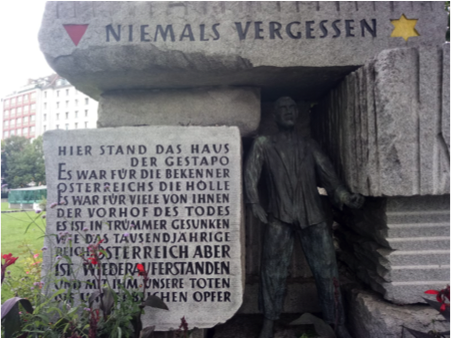VWI invites/goes to...
Cycle of VWI Fellows’ Colloquia
The VWI fellows present their intermediary research results in the context of colloquia which are announced to a small audience and are open to a public audience with an academic and topical interest. The lectures are complemented by a response or commentary by an expert in the given field and are discussed with the other fellows.
Due to the previous lack of an appropriate space, the colloquia were held at other Viennese research and cultural institutions with a topical or regional connection to the given subject. From this circumstance was born the “VWI goes to …” format.
With the move to a new institute building at Rabensteig 3, the spatial circumstances have changed, so that the VWI is now happily able to invite other research and cultural institutions. Therefore, the VWI is now conducting its colloquia both externally and within its own building, in the framework of continued co-operation with other institutions.
The new cycle of fellows’ colloquia “VWI invites/goes to …” is not only able to reach a broader circle of interested persons, but moreover integrates the VWI further into the Viennese scholarly establishment, perhaps even crossing borders into the greater regional research landscape.
| VWI invites/goes to... | |||
| Benedetta Carnaghi: Spies in the Concentration Universe. How Nazi “V-Männer” Contributed to Deportation in the Second World War | |||
Wednesday, 16. January 2019, 15:00 - 17:00 Wiener Wiesenthal Institut, Research Lounge 1010 Vienna, Rabensteig 3, 3rd Floor
|
|||
VWI invites the Austrian Center for Intelligence, Propaganda and Security Studies (ACIPSS)
The Gestapo used so-called Vertrauensmänner or V-Männer [confidence men] to spy on the political opponents of Nazism. Who were these spies and how were they recruited? What was their contribution to the persecution of the Jews throughout Europe? In Vienna, the Gestapo seemed to give top priority to the surveillance and dismantling of resistance groups, using V-Männer who had previous connections or were already integrated within such groups. The Gestapo in Berlin issued general guidelines for the subordinate office in Vienna, but Gestapo officials in Vienna took decisions at their own discretion. What does that tell us about the Anschluss and the Austrians’ uneasy loyalty to Berlin? In Vienna, a small number of Jews also served as spies and informers. The most famous of these Jewish spies was Rudolf Klinger, who was responsible for betraying and dismantling the resistance group led by Ella and Kurt Lingens and Karl Motesiczky. What can we learn by comparing Austria to Vichy and occupied France? The Nazis also used Vertrauensmänner in France, where many of them were identified and tried as “traitors” after the war. But to which “State” did the spies have to be loyal? Some defended themselves against the accusation of treason by arguing that they had simply obeyed Vichy France’s spirit of “collaboration.” What role did Austrian and French spies play in the concentration universe and how did they lead the Nazis to arrest and deport their targets to concentration camps? Drawing on archival sources collected from the French National Archives in Pierrefitte-sur-Seine, the Defense Historical Service in Vincennes, the archives of La Contemporaine in Nanterre, and the Dokumentationsarchiv des österreichischen Widerstandes (DÖW) in Vienna, my presentation will reveal the importance of spies to the Gestapo’s proactive approach to the Nazi persecution—an issue that has long been debated in the existing historiography. Commented by Siegfried Beer Benedetta Carnaghi is a Junior Fellow at the VWI and a Ph.D. candidate in History at Cornell University. She is currently completing a dissertation on the activity of spies in the Fascist secret police, called OVRA, and its Nazi counterpart, the Gestapo, from 1927 (the genesis of the OVRA) to 1945. Her last article Three Layers of Ambiguity: Homosexual Spies and International Intrigue in Fascist Italy was published in the 2017 special issue of The Space Between: Literature and Culture 1914–1945. Siegfried Beer taught late modern and contemporary history at the University of Graz from 1978 to 2013. His main research areas are international politics and Anglo-American cultures since 1776, Austria in the 20th century, and the role of intelligence since 1914. Until 2018 he directed the Austrian Center for Intelligence, Propaganda and Security Studies and published the Journal for Intelligence, Propaganda and Security Studies. Please register at This email address is being protected from spambots. You need JavaScript enabled to view it. by latest Tuesday, 15 January 2019, 12.00 am and bring your ID. Click here to download the invitation as a PDF file. In cooperation with: |
|||








